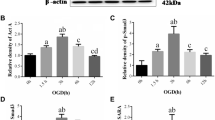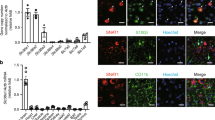Abstract
Ubiquitin-specific protease 22 (USP22) expression was reported to be increased in response to ischemic brain damage, but the biological role and underlying mechanism remain little understood. USP22 shRNA was intravenously injected into the mouse brain, and then a middle cerebral artery occlusion/reperfusion (MCAO/R) mouse model was constructed, and the infarct volume, neurobehavioral deficit score, cell apoptosis, oxidative stress, and autophagy in vivo were evaluated. Oxygen-glucose deprivation/reperfusion (OGD/R) treated pheochromocytoma-12 (PC12) cells were used as an in vitro model of ischemia/reperfusion. The effects of USP22 on proliferation, apoptosis, oxidative stress, and autophagy were explored by CCK-8, flow cytometry, ELISA, and Western blot assays. The relationship between USP22 and the phosphatase and tensin homolog (PTEN) was measured by Co-IP and Western blot assays. Both USP22 and PTEN were highly expressed in MCAO/R mouse brain tissues and OGD/R-induced PC12 cells. In vitro, USP22 knockdown strongly improved OGD/R-mediated changes in cell viability, apoptosis, oxidative stress, and lactate dehydrogenase (LDH) production in PC12 cells. USP22 bound to PTEN and stabilized PTEN expression by decreasing its ubiquitination. PTEN overexpression reversed the promoting effect of USP22 knockdown on cell viability and the inhibitory effects of USP22 knockdown on apoptosis, oxidative stress, and LDH release rate in PC12 cells subjected to OGD/R. PTEN silencing elevated the protein levels of p62, p-mTOR, TFEB, and LAMP1 and reduced the protein levels of LC3-II/LC3-I. USP22 expression levels were negatively correlated with mTOR expression levels, and USP22-shRNA-mediated expression of p62, p-mTOR, TFEB, and LAMP1 was reversed by rapamycin, an inhibitor of mTOR. In vivo, USP22 silencing significantly alleviated infarct volume, neurobehavioral impairments, cell apoptosis, oxidative stress, and autophagy in MCAO/R mice. USP22 knockdown exerts neuroprotective effects in cerebral ischemia/reperfusion injury by downregulating PTEN and activating the mTOR/TFEB pathway.







Similar content being viewed by others

Data availability
The datasets used during the present study are available from the corresponding author upon reasonable request.
Abbreviations
- USP22:
-
Ubiquitin-specific protease 22
- PTEN:
-
Phosphatase and tensin homolog
- MCAO/R:
-
Middle cerebral artery occlusion/reperfusion
- I/R:
-
Ischemia/reperfusion
- OGD/R:
-
Oxygen-glucose deprivation/ reperfusion
- PC12 cells:
-
Pheochromocytoma-12cells
- LDH:
-
Lactate dehydrogenase
- Ub:
-
Ubiquitin
- DUBs:
-
Deubiquitinating enzymes
- CCA:
-
Common carotid artery
- ECA:
-
External carotid artery
- ICA:
-
Internal carotid artery
- FBS:
-
Fetal bovine serum
References
Abudureyimu M, Zhao L, Luo X, Wang X, Liu H (2022) Influences of ALDH2 on cardiomyocyte apoptosis in heart failure rats through regulating PINK1-parkin signaling pathway-mediated mitophagy. Cell Mol Biol (Noisy-le-grand) 68:94–102
Ballar Kirmizibayrak P, Erbaykent-Tepedelen B, Gozen O, Erzurumlu Y (2020) Divergent modulation of proteostasis in prostate cancer. Adv Exp Med Biol 1233:117–151
Ding R, Wu W, Sun Z, Li Z (2020) AMP-activated protein kinase: an attractive therapeutic target for ischemia-reperfusion injury. Eur J Pharmacol 888:173484
Feng T, Ling S, Xu C, Ying L, Su D, Xu X (2021) Ubiquitin-specific peptidase 22 in cancer. Cancer Lett 514:30–37
Galluzzi L, Green DR (2019) Autophagy-independent functions of the autophagy machinery. Cell 177:1682–1699
Hou JB, Shen QN, Wan X, Liu XK, Yu Y, Li M, Gao WW, Zhao B (2021) Ubiquitin-specific protease 29 exacerbates cerebral ischemia-reperfusion injury in mice. Oxid Med Cell Longev 2021:6955628
Ji AL, Li T, Zu G, Feng DC, Li Y, Wang GZ, Yao JH, Tian XF (2019) Ubiquitin-specific protease 22 enhances intestinal cell proliferation and tissue regeneration after intestinal ischemia reperfusion injury. World J Gastroenterol 25:824–836
Jin D, Wei W, Song C, Han P, Leng X (2021) Knockdown EZH2 attenuates cerebral ischemia-reperfusion injury via regulating microRNA-30d-3p methylation and USP22. Brain Res Bull 169:25–34
Kosinsky RL, Zerche M, Saul D, Wang X, Wohn L, Wegwitz F, Begus-Nahrmann Y, Johnsen SA (2020) USP22 exerts tumor-suppressive functions in colorectal cancer by decreasing mTOR activity. Cell Death Differ 27:1328–1340
Li F, Yang B, Li T, Gong X, Zhou F, Hu Z (2019) HSPB8 over-expression prevents disruption of blood-brain barrier by promoting autophagic flux after cerebral ischemia/reperfusion injury. J Neurochem 148:97–113
Liu T, Han S, Dai Q, Zheng J, Liu C, Li S, Li J (2019) IL-17A-mediated excessive autophagy aggravated neuronal ischemic injuries via Src-PP2B-mTOR pathway. Front Immunol 10:2952
Liu N, Peng A, Sun H, Zhuang Y, Yu M, Wang Q, Wang J (2021a) LncRNA AC136007.2 alleviates cerebral ischemic-reperfusion injury by suppressing autophagy. Aging (Albany NY) 13:19587–19597
Liu Z, Wang J, Gao Y, Guo Y, Zhu Y, Sun Y, Yang H (2021b) USP22 regulates the formation and function of placental vasculature during the development of fetal growth restriction. Placenta 111:19–25
Lu C, Ning Z, Wang A, Chen D, Liu X, Xia T, Tekcham DS, Wang W, Li T, Liu X, Liu J, Qi H, Luo H, Du J, Ma C, Yan Q, Liu J, Xu G, Piao HL, Tan G (2018) USP10 suppresses tumor progression by inhibiting mTOR activation in hepatocellular carcinoma. Cancer Lett 436:139–148
Ma S, Sun L, Wu W, Wu J, Sun Z, Ren J (2020) USP22 protects against myocardial ischemia-reperfusion injury via the SIRT1-p53/SLC7A11-dependent inhibition of ferroptosis-induced cardiomyocyte death. Front Physiol 11:551318
Min JW, Lü L, Freeling JL, Martin DS, Wang H (2017) USP14 inhibitor attenuates cerebral ischemia/reperfusion-induced neuronal injury in mice. J Neurochem 140:826–833
Ning Z, Guo X, Liu X, Lu C, Wang A, Wang X, Wang W, Chen H, Qin W, Liu X, Zhou L, Ma C, Du J, Lin Z, Luo H, Otkur W, Qi H, Chen D, Xia T, Liu J, Tan G, Xu G, Piao HL (2022) USP22 regulates lipidome accumulation by stabilizing PPARγ in hepatocellular carcinoma. Nat Commun 13:2187
Pan Q, Liu Y, Wang G, Wen Z, Wang Y (2020) MTMR14 protects against cerebral stroke through suppressing PTEN-regulated autophagy. Biochem Biophys Res Commun 529:1045–1052
Pan R, Xie Y, Fang W, Liu Y, Zhang Y (2022) USP20 mitigates ischemic stroke in mice by suppressing neuroinflammation and neuron death via regulating PTEN signal. Int Immunopharmacol 103:107840
Prabhakaran S, Ruff I, Bernstein RA (2015) Acute stroke intervention: a systematic review. JAMA 313:1451–1462
Roedig J, Kowald L, Juretschke T, Karlowitz R, AhangarianAbhari B, Roedig H, Fulda S, Beli P, van Wijk SJ (2021) USP22 controls necroptosis by regulating receptor-interacting protein kinase 3 ubiquitination. EMBO Rep 22:e50163
Sang Z, Zhang P, Wei Y, Dong S (2020) miR-214-3p attenuates sepsis-induced myocardial dysfunction in mice by inhibiting autophagy through PTEN/AKT/mTOR pathway. Biomed Res Int 2020:1409038
Schauer NJ, Liu X, Magin RS, Doherty LM, Chan WC, Ficarro SB, Hu W, Roberts RM, Iacob RE, Stolte B, Giacomelli AO, Perera S, McKay K, Boswell SA, Weisberg EL, Ray A, Chauhan D, Dhe-Paganon S, Anderson KC, Griffin JD, Li J, Hahn WC, Sorger PK, Engen JR, Stegmaier K, Marto JA, Buhrlage SJ (2020) Selective USP7 inhibition elicits cancer cell killing through a p53-dependent mechanism. Sci Rep 10:5324
Song S, Wang Y, Wang HY, Guo LL (2022) Role of sevoflurane in myocardial ischemia-reperfusion injury via the ubiquitin-specific protease 22/lysine-specific demethylase 3A axis. Bioengineered 13:13366–13383
Thrift AG, Dewey HM, Macdonell RA, McNeil JJ, Donnan GA (2001) Incidence of the major stroke subtypes: initial findings from the North East Melbourne stroke incidence study (NEMESIS). Stroke 32:1732–1738
Wang Y, Le WD (2019) Autophagy and ubiquitin-proteasome system. Adv Exp Med Biol 1206:527–550
Wang L, Wu D, Xu Z (2019) USP10 protects against cerebral ischemia injury by suppressing inflammation and apoptosis through the inhibition of TAK1 signaling. Biochem Biophys Res Commun 516:1272–1278
Yuan Q, Yuan Y, Zheng Y, Sheng R, Liu L, Xie F, Tan J (2021) Anti-cerebral ischemia reperfusion injury of polysaccharides: a review of the mechanisms. Biomed Pharmacother 137:111303
Author information
Authors and Affiliations
Contributions
Yanling Li and Jing Gao wrote the manuscript. Chuntian Liu and Yanling Li designed this study. Ning Bu and Shuqin Zhan performed the experimental work. Haiqin Wu and Ru Zhang provided the majority of statistical analysis as well as provided the figures and tables for the manuscript. Hong Sun and Hong Fan collected a large amount of data for the dataset. All authors read and approved the final manuscript. Yanling Li and Hong Su performed double-blind examinations. The authors declare that all data were generated in-house and that no paper mill was used.
Corresponding author
Ethics declarations
Ethics approval
This study was approved by the Animal Care and Use Committee of the Second Affiliated Hospital of Xi’an Jiaotong University (ethical approval number: XAJTDX-2020-046).
Competing interests
The authors declare no competing financial interests regarding the publication of the present study.
Consent for publication
Consent for publication was obtained from each author.
Additional information
Publisher's note
Springer Nature remains neutral with regard to jurisdictional claims in published maps and institutional affiliations.
Supplementary Information
Below is the link to the electronic supplementary material.
Rights and permissions
Springer Nature or its licensor (e.g. a society or other partner) holds exclusive rights to this article under a publishing agreement with the author(s) or other rightsholder(s); author self-archiving of the accepted manuscript version of this article is solely governed by the terms of such publishing agreement and applicable law.
About this article
Cite this article
Li, Y., Gao, J., Liu, C. et al. USP22 knockdown protects against cerebral ischemia/reperfusion injury via destabilizing PTEN protein and activating the mTOR/TFEB pathway. Naunyn-Schmiedeberg's Arch Pharmacol 396, 3163–3175 (2023). https://doi.org/10.1007/s00210-023-02524-3
Received:
Accepted:
Published:
Issue Date:
DOI: https://doi.org/10.1007/s00210-023-02524-3



